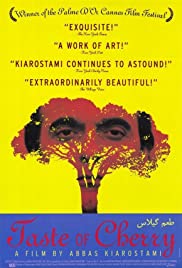
A TASTE OF CHERRY
Iran, 1997, 94 minutes, Colour.
Homayoun Ershadi.
Directed by Abbas Kierostami.
A Taste of Cherry is an Iranian film the commentators suggest audiences should see. It won the Palme D’ Or at Cannes in 1997. It has continued to receive acclaim.
Abbas Kierostami is considered one of Iran’s greatest directors, a range of films in the 1990s exploring metaphysical themes, dramatising them within the context of Iranian society. He later became more experimental, filming from cars and taxis, interior dramas.
This is a film about life and death. The central character is a Kurd who has decided that he should die – and the film is his journey, physical and spiritual, encountering a cross section of characters, old and young, workers and soldiers, a seminarian, trying to persuade them to help him with his death. Eventually, he comes across an old taxidermist who himself has attempted suicide and is willing to help.
As with many Kierostami films, there is a lot of driving around the countryside. The director observes his country and its people intensely but also raises profound questions about the meaning of life, and death.
1. The title? Relishing the taste of cherry in order to continue living?
2. The work of the director, his status in Iran, throughout the world?
3. The director and his use of cars and driving in so many films? The landscapes, the mountains, the desert, the roads, the towns and buildings, quarries? The musical score?
4. The introduction to the driver, the camera survey in the city and people from his point of view in the car? His looking at all the workers, the labourers asking for work, his refusal? The young man, the proposition, attacking him, running down the mountain? The foreigner, the labourer, not enough for the man’s requirements? His continuing, picking up the young soldier?
5. Soldier, a young Kurd, listening to the propositions, a long conversation, having to get back to the barracks, his story about Kurdistan, his relatives in turnaround, having to be back by 6.00 pm? Running away?
6. The workers in the field, the car breaking down, then lifting the car, grinning at the achievement?
7. The cement mixer, the security guard and his post, the man climbing up? Afghan, his sense of responsibility?
8. Issues of loneliness, death, war, war with Iraq, sadness?
9. The man, his pacing, talking with the security guard, the conversation, the T?
10. The seminar rest, a pleasant young man, his explanation of himself Afghan, going to Ireland to study? Is savings, working as a labourer? The main telling the seminar rest that God was exhausted, he could not wait? The suicide theme, the quotation from the Koran, the demands? The driver saying that be a happy is a great sin if it means hurting others? The motivation for suicide?
11. The quarry, the trucks, the rubble? The young worker demanding that the driver should move his car?
12. The older man, the conversation, willing to help, 35 years in the desert, his own attempted suicide, but tasting the mulberries, seeing the sunrise, hearing the children’s voices, his wife enjoying the mulberries? Is telling the joke, the main telling the doctor that when he touched everywhere he was sore and the doctor diagnosing a broken finger! The urge to be optimistic? Talking a lot? Agreeing to the conditions? His own work in the natural history museum, working with the birds?
13. The moment of taking the photo for the couple? His chasing the man into the natural museum, buying the ticket, taxidermy, stuffing the birds, his pacing outside, the flocks of birds flying in the sky? His talking with the old man, mentioning throwing two stones – better for three?
14. At home, the audience viewing him through the curtain window? Night, driving, sitting on smoking, going into the whole, the vision of the moon, thunder and lightning, his lying in the rain?
15. The setting up of the cameras, the filming of the military, the making of the film, the soldiers, the jazz – and the effect of this kind of postscript to the film and its theme?